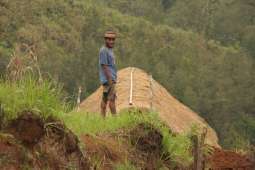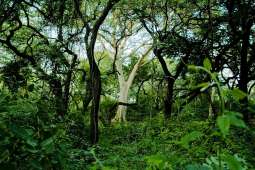NEWS
CBD report on Biodiversity and Climate Change
The Bureau of the Conference of the Parties to the Convention on
Biological Diversity (CBD), at its meeting held in Strömstad,
Sweden, on 10 September 2009, welcomed the finalization of the
report of the Second Ad Hoc Technical Expert Group (AHTEG) on
Biodiversity and Climate Change and authorized the Executive
Secretary to issue it in the CBD Technical Series. The report will
be posted online in October with a printed version launched at the
fifteenth meeting of the Conference of the Parties to the UNFCCC.
The report contains key messages on REDD efforts, as well as
information on biodiversity and adaptation to climate change. The
main messages in the report will be translated into all United
Nations languages. More:
http://www.cbd.int/doc/press/2009/pr-2009-09-11-cc-en.pdf
 First Joint CBD/UNFF Capacity Building Workshop on Forest Biodiversity and Climate Change, Singapore, 2 to 5 September 2009
First Joint CBD/UNFF Capacity Building Workshop on Forest Biodiversity and Climate Change, Singapore, 2 to 5 September 2009
A capacity building workshop for Southern and South-Eastern Asia on
forest biodiversity and climate change was held in Singapore, from 2 to 5
September 2009. The workshop was organized by the Secretariat of the Convention
on Biological Diversity (CBD), the United Nations Forum on Forests (UNFF)
Secretariat and the National Parks Board of Singapore, with the generous
financial support of the government of Germany and the ASEAN Centre for
Biodiversity (ACB). The purpose of the workshop was to support the efforts of
CBD Parties to achieve synergies between the implementation of the CBD programme
of work on forest biodiversity, the non-legally binding instrument on all types
of forests of the UNFF, and forest-related climate change mitigation and
adaptation activities, including REDD. More:
http://www.cbd.int/doc/?meeting=WSCB-FBDCC-01

REDD – Building on the foundations of field-based conservation
As all eyes focus on Copenhagen and as REDD project development
gathers pace, it is clear that the success of REDD will ultimately
depend upon effective forest protection. Fauna and Flora International
has drawn on its 100 year history of habitat management to collate a
series of lessons learnt and recommendations relevant to the
development of REDD projects. Download the briefing here:
http://www.fauna-flora.org/making-redd-work.php
Call for Action: Regional Forum for People and Forests - Carbon Financing
From 18 to 20 August 2009, the First Regional Forum for People and
Forests analyzed the risks, opportunities, and constraints that
carbon financing presents for Asia-Pacific's forest-dependent
people. The Forum concluded that local people hold the key to
healthy forests, and if forest carbon-financing schemes are to
succeed they must actively engage and benefit these crucial
stakeholders.
To view the Call for Action, click
here, and for more information on the Forum:
http://www.recoftc.org/site/
|
ARTICLES

A series of articles on REDD in the developing world published by the Science and Development Network (SciDev.Net)
This spotlight offers a genuine international perspective to the debate,
with a series of articles and commentaries written by experts including Godwin Kowero,
head of the African Forest Forum in Kenya, N.H. Ravindranath and Shamama Afreen, researchers at the
Indian Institute of Science in Bangalore, India, and Roman Czebiniak,
policy advisor on climate change and forests for Greenpeace
International. The collection of articles explores the role of science
in informing REDD, examines what research is needed to implement it,
considers key issues facing policymakers such as how to marry
environmental and livelihood goals, and highlights the options for
different regions of the developing world. Read SciDev.Net's spotlight
on reducing forestry emissions here: More information on the UN REDD Programme:
http://www.scidev.net/en/climate-change-and-energy/reducing-forest-emissions
Need for integration: Assessment of REDD monitoring costs
Findings from a recent article reveal that the design of a
REDD policy framework can have a significant impact on monitoring
costs. Although monitoring costs are relatively small compared to
other cost items within a REDD system, they should be shared not
only among countries but also among sectors, because an integrated
monitoring system would have multiple benefits for non-REDD
management. To read this new article in Carbon Balance and
Management:
http://www.cbmjournal.com/content/4/1/7
|
|
How can you publish in this Newsletter?
Your contributions to this Newsletter on issues related to
biodiversity aspects of REDD are welcome. Please send your
submission to
[email protected], Subject "REDD Newsletter". Articles should
contain no more than 60 words, and must contain a hyperlink for
more information. more information please see:
http://www.cbd.int/forest/redd/newsletters/
Deadline to submit articles for the next issue: 16 November 09.
This Newsletter is published pursuant to CBD decision IX/5.
The views expressed in this publication do not necessarily
reflect the views of the Secretariat of the CBD.
|


